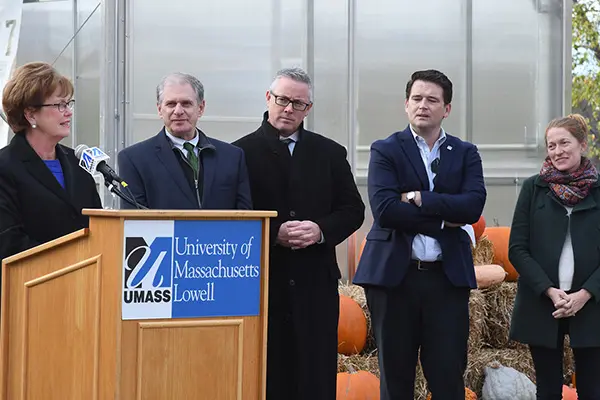Greenhouse for urban agriculture opens at UMass Lowell
 Image by Tory Wesnofske
Image by Tory Wesnofske
11/13/2017
Lowell Sun
By Chris Lisinski
LOWELL -- Mill City Grows couldn't have planned to unveil its new greenhouse, part of a partnership with UMass Lowell, just one day before a blast of arctic air caused temperatures to plummeted into the teens. But the timing certainly did fit.
With the new facility, the local urban agriculture organization will be able to extend its growing season, bringing fresh, healthy produce to Lowell residents even during long chills.
"Here's the very challenging thing about growing in New England: weather," said Lydia Sisson, one of the founders of Mill City Grows. "The huge benefit of this is we get to start our seasons early and extend our season."
Some seedlings need to be planted as early as February, when the ground is often still covered in snow, but the greenhouse will allow Mill City Grows to circumvent that problem, Sisson said. The organization will also be able to continue harvests later into the year.
On Thursday, Sisson and UML officials led a tour of the greenhouse for Massachusetts Department of Agriculture Commissioner John Lebeaux followed by a ribbon-cutting ceremony.
The university had owned the structure previously, but it was mostly dormant until Mill City Grows inquired about it last year. Both parties agreed to work together, and today, farming is already underway with a second phase about to begin.
Standing in the 30-foot-by-60-foot structure, Sisson pointed to various crops that will be ready this winter, including spinach, Brussels sprouts and less common options such as turmeric.
Sisson said the greenhouse would feature "a lot of experimentation."
The property surrounding the greenhouse, which sits on UML's east campus, was converted from a parking lot into additional farmland with some clever green thumb techniques, such as planting deep-growing daikon radish that will die in place over the winter and fertilize the soil.
Mill City Grows partnered with UML for the project. Produce grown on the site will be used in university dining halls, and the space will be shared with academic projects as well.
"We have a real opportunity to do something special here," said Ruirai O'Mahony, UML's associate director of sustainability.
At the ceremony, Lebeaux announced recipients of the state's 2018 Urban Agriculture Grant Program, among them Mill City Grows.
With the greenhouse, Mill City Grows, now in its eighth year, has three different urban farms across the city that grow 30,000 pounds of food annually as well as several community gardens that produce 20,000 pounds of crops annually.
Officials praised the organization -- and Sisson, who is a UML alum -- during Thursday's ceremony as a valuable member of the city that sets an example for others.
"Your vision is always so astounding to me," said UML Chancellor Jacqueline Moloney.
